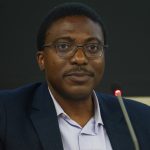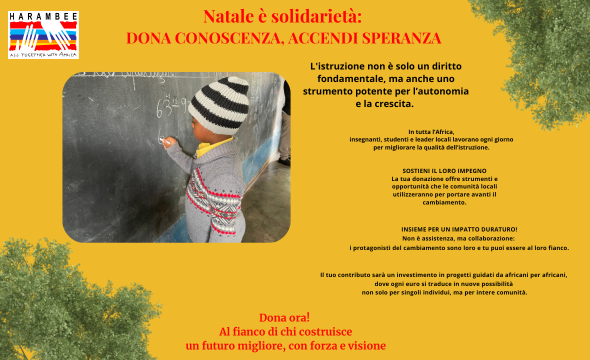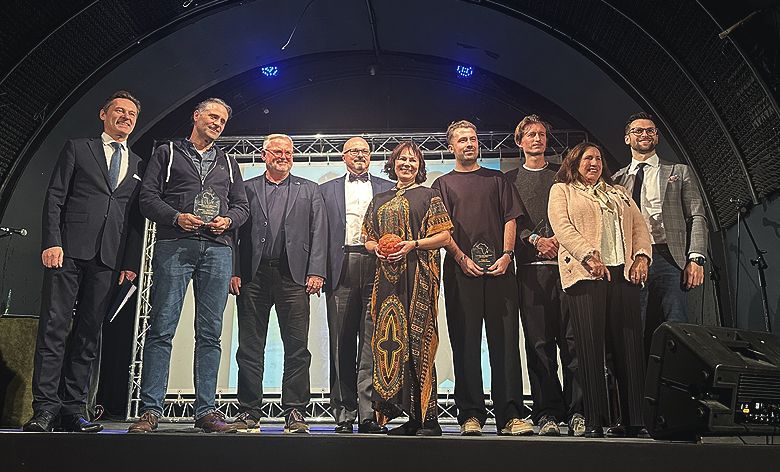The key to lasting development is strategic partnerships that focus on human capital development, with less bureaucratic paperwork and more goal-oriented approaches. Ito Diejomaoh, director of the Niger Foundation Hospital, Harambee's partner for health and social projects in Nigeria, is convinced of this. On his last visit to Rome, the director highlighted the challenges facing Africa, such as persistent poverty in large areas, limited access to basic needs, lack of infrastructural resources and outlined ways of effective cooperation. “
Aid can be important in saving lives and providing relief in times of crisis, but it should also facilitate sustainable development by building the capacity of communities to address their own development needs”.
Read here the text of his speech

THE FUTURE OF AFRICA: AID OR ALLIANCE.
The title of this presentation is very suggestive and I don’t think it is too daring to state that the answer is already implied in it. Even though we know it well, Africa is made up of many countries with widely varying features and needs. However, large areas are facing conditions in which many individuals are in poverty with poor access to the sufficient means to live a materially dignified life. A detailed report by the Nigerian Bureau of Statistics reports that about 40% of its 200 million population (83 million people) live on $380 per year. Just about a $1 a day. Access to basic requirements like water, healthcare and education can be extrapolated from this. The goal of fostering sustainable development is daunting. This is clearly Africa’s problem. And though it’s easier for me to say because I am a beneficiary, but starting from the principle of solidarity, it is actually everyone’s problem. Nobody really benefits from an impoverished Africa. The fact that one can contribute towards saving lives, reducing suffering and help others in the short run is encouraging.
When considers that with giving now, he can play a role in the future development of another person, the value of that effort increases exponentially. To understand better the needs of the continent it is necessary to understand that public institutions in Nigeria often face bureaucratic and structural problems, including corruption, that make it difficult for them to achieve their aim. Case in point. Just last year, there was a strike by Resident Doctors that lasted almost three months. This crippled the public healthcare infrastructure in the period and put pressure on private and non-profit healthcare institutions. We receive no financial support or subsidy from the government and coped the best we could. The need for better and stronger infrastructure, both physical and human was evident.
More examples could be gotten simply by moving a little further back to the effects of the COVID pandemic where the inability of institutions to meet up with the challenges of the pandemic may be very hard to imagine. It’s important to understand that most private non-profit institutions will require external help to achieve any reasonable capacity increase. A recent experience in Niger Foundation Hospital is rather encouraging and promising.
There are 15 ICU beds (in varying states of operation) in the Enugu State, catering to a population of 3.3 million people. This is a ratio of less 0.5 per 100,000 population compared with 8.9 per 100,000 in South Africa some hundreds of Kilometres south. During the COVID pandemic, it amounted to an insignificant number. With the support of Harambee and the Harambee America Committee, the hospital is in the process of finalising a 2-bed ICU. In addition to donating a ventilator Harambee America have offered critical care training for the nursing team. The process of identifying our need comprised of a couple of questions on where a donation could be channelled comprised of a few emails and some documentation.
We managed to raise funds for another ventilator and kick-started the project.This is the definition of high-impact support. Once fully operational the ICU-Population ratio of an entire region will be raised by almost 15 percent. Furthermore, it is entrusting it to an institution that will ensure that those beds are functional and the unit is well-run for a long time. In the not too distant future, there will certainly be stories of individual lives that will have been saved by this ICU. It’s just one example of how partnerships can drive impactful and sustainable change.
Our experience with volunteers has always been good. For any lasting development a focus on human capital development is key. When we have had input from professionals with different areas of expertise including health, education, communication/advocacy, etc. there is a deeper impact. Volunteers always help as experts in a variety of fields they share knowledge and best practice, with the possible added value of aiding innovation by combining with the existing local ways of doing things. I would like to believe that the volunteers come out enriched by the experience of a different culture and a first-hand knowledge of the mode of operation in a resource restricted environment. Aid is very useful. It conveys a relationship in which a well-meaning individual or corporate body renders unilateral help to others. This is praise-worthy. The ability to empathise with others in need is at the root of what makes us human. There are cases, such as aid to countries in crisis, where such giving is critical and saves countless lives.
There will always be the need for such whether in Africa or somewhere else. Giving becomes a bit more complicated when dealing with “Africa” which as we have stated before is a large continent made up of countries with very different, distinctive features and by implication different needs. Even with the best intentions, a
one cap fits all solution can be inefficient at the best and often disruptive and even harmful. This is a long discussion. But I will suggest that an important goal of aid should be to facilitate sustainable development such that institutions can, over time, grow the capacity of their communities to address their own development needs. This is a problem that no one party can solve alone. There need to be coordinated efforts, partnerships to make a significant dent. While aid has to be targeted, we need to move beyond that to forming strategic partnerships that are not simply temporary relationships to achieve some specific task.
In a partnership there is solidarity between partners and aid beneficiaries to bring about sustainable and transformational change in needy communities. The truth is that in this relationship both giver and recipient should undergo transformation. The process of identifying needs has to balance what I can give with what the local community needs in a discussion that, based on a foundation of shared goals, values and trust, reduces bureaucratic paper work and is a lot more goal-oriented. A partnership thus based on trust and shared values will always be flexible in its approach towards problem solving with the goal always in mind while keeping an eye on accountability.
In Africa we need to develop more our human and physical infrastructure. I speak from the perspective of healthcare in Enugu State in Nigeria, an area with which I am more familiar. Very likely it is applicable to other regions in Nigeria and maybe other countries in sub-Saharan Africa. We need better facilities, more equipment and more training and empowerment of our people. And we need help to do this. The good news is that with the situation as it exists, the opportunities for high-impact giving are abundant. With partnerships and strategic alliances between donor and recipient much more can be done, better and in a more lasting way. I also believe that all parties come out better from it.
HARAMBEE IS COMMITTED TO STRENGTHENING NIGER FOUNDATION HOSPITAL, CLICK HERE FOR INFORMATION ABOUT THE CURRENT PROJECT









